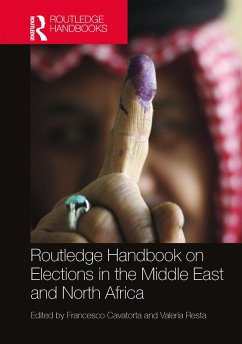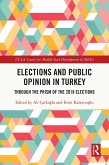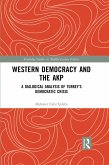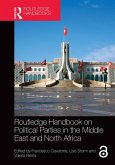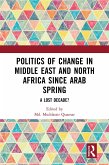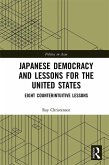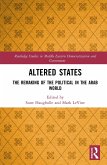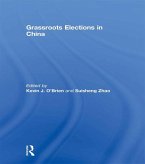Routledge Handbook on Elections in the Middle East and North Africa (eBook, PDF)
Redaktion: Cavatorta, Francesco; Resta, Valeria
46,95 €
46,95 €
inkl. MwSt.
Sofort per Download lieferbar

23 °P sammeln
46,95 €
Als Download kaufen

46,95 €
inkl. MwSt.
Sofort per Download lieferbar

23 °P sammeln
Jetzt verschenken
Alle Infos zum eBook verschenken
46,95 €
inkl. MwSt.
Sofort per Download lieferbar
Alle Infos zum eBook verschenken

23 °P sammeln
Routledge Handbook on Elections in the Middle East and North Africa (eBook, PDF)
Redaktion: Cavatorta, Francesco; Resta, Valeria
- Format: PDF
- Merkliste
- Auf die Merkliste
- Bewerten Bewerten
- Teilen
- Produkt teilen
- Produkterinnerung
- Produkterinnerung

Bitte loggen Sie sich zunächst in Ihr Kundenkonto ein oder registrieren Sie sich bei
bücher.de, um das eBook-Abo tolino select nutzen zu können.
Hier können Sie sich einloggen
Hier können Sie sich einloggen
Sie sind bereits eingeloggt. Klicken Sie auf 2. tolino select Abo, um fortzufahren.

Bitte loggen Sie sich zunächst in Ihr Kundenkonto ein oder registrieren Sie sich bei bücher.de, um das eBook-Abo tolino select nutzen zu können.
This handbook analyses elections in the Middle East and North Africa and seeks to overcome normative assumptions about the linkage between democracy and elections.
- Geräte: PC
- ohne Kopierschutz
- eBook Hilfe
- Größe: 51.36MB
Andere Kunden interessierten sich auch für
![Elections and Public Opinion in Turkey (eBook, PDF) Elections and Public Opinion in Turkey (eBook, PDF)]() Elections and Public Opinion in Turkey (eBook, PDF)44,95 €
Elections and Public Opinion in Turkey (eBook, PDF)44,95 €![Western Democracy and the AKP (eBook, PDF) Western Democracy and the AKP (eBook, PDF)]() Mehmet Celil ÇelebiWestern Democracy and the AKP (eBook, PDF)37,95 €
Mehmet Celil ÇelebiWestern Democracy and the AKP (eBook, PDF)37,95 €![Routledge Handbook on Political Parties in the Middle East and North Africa (eBook, PDF) Routledge Handbook on Political Parties in the Middle East and North Africa (eBook, PDF)]() Routledge Handbook on Political Parties in the Middle East and North Africa (eBook, PDF)44,95 €
Routledge Handbook on Political Parties in the Middle East and North Africa (eBook, PDF)44,95 €![Politics of Change in Middle East and North Africa since Arab Spring (eBook, PDF) Politics of Change in Middle East and North Africa since Arab Spring (eBook, PDF)]() Politics of Change in Middle East and North Africa since Arab Spring (eBook, PDF)42,95 €
Politics of Change in Middle East and North Africa since Arab Spring (eBook, PDF)42,95 €![Japanese Democracy and Lessons for the United States (eBook, PDF) Japanese Democracy and Lessons for the United States (eBook, PDF)]() Ray ChristensenJapanese Democracy and Lessons for the United States (eBook, PDF)43,95 €
Ray ChristensenJapanese Democracy and Lessons for the United States (eBook, PDF)43,95 €![Altered States (eBook, PDF) Altered States (eBook, PDF)]() Altered States (eBook, PDF)42,95 €
Altered States (eBook, PDF)42,95 €![Grassroots Elections in China (eBook, PDF) Grassroots Elections in China (eBook, PDF)]() Grassroots Elections in China (eBook, PDF)30,95 €
Grassroots Elections in China (eBook, PDF)30,95 €-
-
-
This handbook analyses elections in the Middle East and North Africa and seeks to overcome normative assumptions about the linkage between democracy and elections.
Dieser Download kann aus rechtlichen Gründen nur mit Rechnungsadresse in A, B, BG, CY, CZ, D, DK, EW, E, FIN, F, GR, HR, H, IRL, I, LT, L, LR, M, NL, PL, P, R, S, SLO, SK ausgeliefert werden.
Produktdetails
- Produktdetails
- Verlag: Taylor & Francis eBooks
- Seitenzahl: 460
- Erscheinungstermin: 31. März 2023
- Englisch
- ISBN-13: 9781000829518
- Artikelnr.: 67485639
- Verlag: Taylor & Francis eBooks
- Seitenzahl: 460
- Erscheinungstermin: 31. März 2023
- Englisch
- ISBN-13: 9781000829518
- Artikelnr.: 67485639
- Herstellerkennzeichnung Die Herstellerinformationen sind derzeit nicht verfügbar.
Francesco Cavatorta is Professor in the Department of Political Science, Université Laval, Québec, Canada. He is currently working on a collaborative project examining political parties and coalition governments in the Middle East and North Africa. Valeria Resta is Guest Lecturer in the Department of Social and Political Sciences, Bocconi University, Milan, Italy. She is currently working on a collaborative project examining political parties and coalition governments in the Middle East and North Africa.
1. Elections in the Middle East and North Africa Part 1: Elections in
authoritarian settings 2. The functions of authoritarian elections:
symbolism, safety valves and clientelism 3. Elections and the management of
plurality in Algeria 4. Parliamentary elections under Mohamed VI's reign
(2002-2021) 5. Electoral districts in Jordan: an analytical study 6.
Elections in Mauritania: the role of the military 7. "Only Me": Repression,
Legal Engineering, and State-Managed Elections in Sisi's Egypt Part 2:
Elections in democratic and quasi-democratic settings 8. Israel's Electoral
System and Political Instability: Electoral Fragmentation, Party Unity and
the Prime Ministers' Political Leadership 9. When free and fair elections
are not enough. Party fragmentation and unaccountability in Tunisia 10.
Pre-electoral coalitions in Iraq: the case of the Communist-Sadrist
alliance 11. Elections and democratic backsliding in Turkey 12. From
one-sect one-vote to one-man one-vote? Demands for reforming the electoral
system in Lebanon 13. Competition under systemic religious constraints:
presidential elections in Iran Part 3: Rules, institutions and the
infrastructure of elections 14. The management of elections in Tunisia: the
Independent High Authority for Elections 15. Partial and non-partisan: the
municipal council elections in Saudi Arabia 16. Elections in the Arab
world: international monitoring and assistance 17. The independence
referendum in Kurdistan 18. Gender Quotas, Constituency Service, and
Women's Empowerment: Lessons from Algeria Part 4: Elections and campaigning
19. A minority goes to the polls: Arab voters in Israel 20. Elections in
Occupied Palestine: control, resistance and contention 21. Electoral
campaigns in post-Ben Ali's Tunisia: electoral expertise and renewed
clientelism 22. Digital strategies of Tunisian political parties: the case
of the 2018 local elections 23. The role of media in electoral campaigns in
the pandemic era. The case of Kuwait 24. Opposition Coordination under a
Competitive Authoritarian Regime. The Case of the 2019 Local Elections in
Turkey 25. Polarisation and elections under competitive authoritarianism:
the case of Turkey after 2013 26. From ballots to bullets: Libyan 2012
elections as the origin of the unachieved transition Part 5: Voting
behaviour 27. The rationality of the Arab voter 28. Clientelism in MENA
elections 29. The consequences on Arab voters of Arab Palestinian parties'
quest for power in Israeli politics 30. Class and religious cleavages. The
case of Lebanon 31. Ideology and electoral choices in Arab elections 32.
The Arab Generation Z: from Disillusionment to Pragmatism
authoritarian settings 2. The functions of authoritarian elections:
symbolism, safety valves and clientelism 3. Elections and the management of
plurality in Algeria 4. Parliamentary elections under Mohamed VI's reign
(2002-2021) 5. Electoral districts in Jordan: an analytical study 6.
Elections in Mauritania: the role of the military 7. "Only Me": Repression,
Legal Engineering, and State-Managed Elections in Sisi's Egypt Part 2:
Elections in democratic and quasi-democratic settings 8. Israel's Electoral
System and Political Instability: Electoral Fragmentation, Party Unity and
the Prime Ministers' Political Leadership 9. When free and fair elections
are not enough. Party fragmentation and unaccountability in Tunisia 10.
Pre-electoral coalitions in Iraq: the case of the Communist-Sadrist
alliance 11. Elections and democratic backsliding in Turkey 12. From
one-sect one-vote to one-man one-vote? Demands for reforming the electoral
system in Lebanon 13. Competition under systemic religious constraints:
presidential elections in Iran Part 3: Rules, institutions and the
infrastructure of elections 14. The management of elections in Tunisia: the
Independent High Authority for Elections 15. Partial and non-partisan: the
municipal council elections in Saudi Arabia 16. Elections in the Arab
world: international monitoring and assistance 17. The independence
referendum in Kurdistan 18. Gender Quotas, Constituency Service, and
Women's Empowerment: Lessons from Algeria Part 4: Elections and campaigning
19. A minority goes to the polls: Arab voters in Israel 20. Elections in
Occupied Palestine: control, resistance and contention 21. Electoral
campaigns in post-Ben Ali's Tunisia: electoral expertise and renewed
clientelism 22. Digital strategies of Tunisian political parties: the case
of the 2018 local elections 23. The role of media in electoral campaigns in
the pandemic era. The case of Kuwait 24. Opposition Coordination under a
Competitive Authoritarian Regime. The Case of the 2019 Local Elections in
Turkey 25. Polarisation and elections under competitive authoritarianism:
the case of Turkey after 2013 26. From ballots to bullets: Libyan 2012
elections as the origin of the unachieved transition Part 5: Voting
behaviour 27. The rationality of the Arab voter 28. Clientelism in MENA
elections 29. The consequences on Arab voters of Arab Palestinian parties'
quest for power in Israeli politics 30. Class and religious cleavages. The
case of Lebanon 31. Ideology and electoral choices in Arab elections 32.
The Arab Generation Z: from Disillusionment to Pragmatism
1. Elections in the Middle East and North Africa Part 1: Elections in
authoritarian settings 2. The functions of authoritarian elections:
symbolism, safety valves and clientelism 3. Elections and the management of
plurality in Algeria 4. Parliamentary elections under Mohamed VI's reign
(2002-2021) 5. Electoral districts in Jordan: an analytical study 6.
Elections in Mauritania: the role of the military 7. "Only Me": Repression,
Legal Engineering, and State-Managed Elections in Sisi's Egypt Part 2:
Elections in democratic and quasi-democratic settings 8. Israel's Electoral
System and Political Instability: Electoral Fragmentation, Party Unity and
the Prime Ministers' Political Leadership 9. When free and fair elections
are not enough. Party fragmentation and unaccountability in Tunisia 10.
Pre-electoral coalitions in Iraq: the case of the Communist-Sadrist
alliance 11. Elections and democratic backsliding in Turkey 12. From
one-sect one-vote to one-man one-vote? Demands for reforming the electoral
system in Lebanon 13. Competition under systemic religious constraints:
presidential elections in Iran Part 3: Rules, institutions and the
infrastructure of elections 14. The management of elections in Tunisia: the
Independent High Authority for Elections 15. Partial and non-partisan: the
municipal council elections in Saudi Arabia 16. Elections in the Arab
world: international monitoring and assistance 17. The independence
referendum in Kurdistan 18. Gender Quotas, Constituency Service, and
Women's Empowerment: Lessons from Algeria Part 4: Elections and campaigning
19. A minority goes to the polls: Arab voters in Israel 20. Elections in
Occupied Palestine: control, resistance and contention 21. Electoral
campaigns in post-Ben Ali's Tunisia: electoral expertise and renewed
clientelism 22. Digital strategies of Tunisian political parties: the case
of the 2018 local elections 23. The role of media in electoral campaigns in
the pandemic era. The case of Kuwait 24. Opposition Coordination under a
Competitive Authoritarian Regime. The Case of the 2019 Local Elections in
Turkey 25. Polarisation and elections under competitive authoritarianism:
the case of Turkey after 2013 26. From ballots to bullets: Libyan 2012
elections as the origin of the unachieved transition Part 5: Voting
behaviour 27. The rationality of the Arab voter 28. Clientelism in MENA
elections 29. The consequences on Arab voters of Arab Palestinian parties'
quest for power in Israeli politics 30. Class and religious cleavages. The
case of Lebanon 31. Ideology and electoral choices in Arab elections 32.
The Arab Generation Z: from Disillusionment to Pragmatism
authoritarian settings 2. The functions of authoritarian elections:
symbolism, safety valves and clientelism 3. Elections and the management of
plurality in Algeria 4. Parliamentary elections under Mohamed VI's reign
(2002-2021) 5. Electoral districts in Jordan: an analytical study 6.
Elections in Mauritania: the role of the military 7. "Only Me": Repression,
Legal Engineering, and State-Managed Elections in Sisi's Egypt Part 2:
Elections in democratic and quasi-democratic settings 8. Israel's Electoral
System and Political Instability: Electoral Fragmentation, Party Unity and
the Prime Ministers' Political Leadership 9. When free and fair elections
are not enough. Party fragmentation and unaccountability in Tunisia 10.
Pre-electoral coalitions in Iraq: the case of the Communist-Sadrist
alliance 11. Elections and democratic backsliding in Turkey 12. From
one-sect one-vote to one-man one-vote? Demands for reforming the electoral
system in Lebanon 13. Competition under systemic religious constraints:
presidential elections in Iran Part 3: Rules, institutions and the
infrastructure of elections 14. The management of elections in Tunisia: the
Independent High Authority for Elections 15. Partial and non-partisan: the
municipal council elections in Saudi Arabia 16. Elections in the Arab
world: international monitoring and assistance 17. The independence
referendum in Kurdistan 18. Gender Quotas, Constituency Service, and
Women's Empowerment: Lessons from Algeria Part 4: Elections and campaigning
19. A minority goes to the polls: Arab voters in Israel 20. Elections in
Occupied Palestine: control, resistance and contention 21. Electoral
campaigns in post-Ben Ali's Tunisia: electoral expertise and renewed
clientelism 22. Digital strategies of Tunisian political parties: the case
of the 2018 local elections 23. The role of media in electoral campaigns in
the pandemic era. The case of Kuwait 24. Opposition Coordination under a
Competitive Authoritarian Regime. The Case of the 2019 Local Elections in
Turkey 25. Polarisation and elections under competitive authoritarianism:
the case of Turkey after 2013 26. From ballots to bullets: Libyan 2012
elections as the origin of the unachieved transition Part 5: Voting
behaviour 27. The rationality of the Arab voter 28. Clientelism in MENA
elections 29. The consequences on Arab voters of Arab Palestinian parties'
quest for power in Israeli politics 30. Class and religious cleavages. The
case of Lebanon 31. Ideology and electoral choices in Arab elections 32.
The Arab Generation Z: from Disillusionment to Pragmatism
